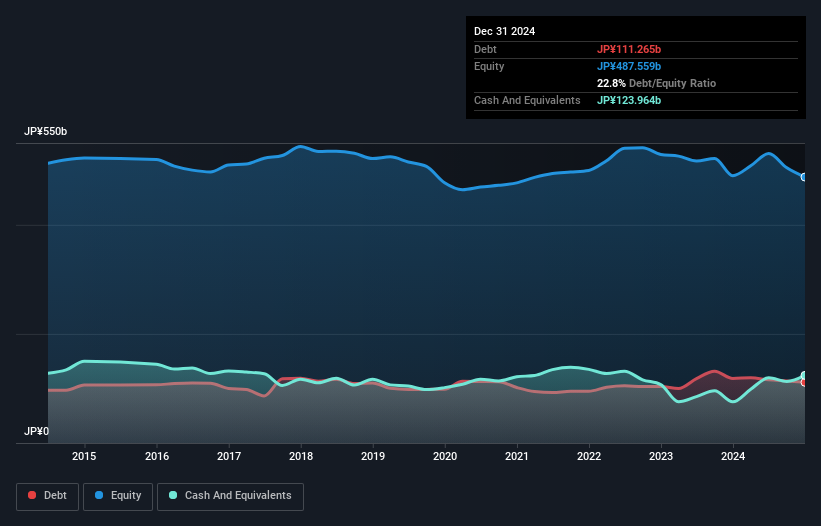- Japan
- /
- Electronic Equipment and Components
- /
- TSE:5214
We Think Nippon Electric Glass (TSE:5214) Can Stay On Top Of Its Debt
Howard Marks put it nicely when he said that, rather than worrying about share price volatility, 'The possibility of permanent loss is the risk I worry about... and every practical investor I know worries about.' It's only natural to consider a company's balance sheet when you examine how risky it is, since debt is often involved when a business collapses. We note that Nippon Electric Glass Co., Ltd. (TSE:5214) does have debt on its balance sheet. But the real question is whether this debt is making the company risky.
What Risk Does Debt Bring?
Debt assists a business until the business has trouble paying it off, either with new capital or with free cash flow. In the worst case scenario, a company can go bankrupt if it cannot pay its creditors. However, a more usual (but still expensive) situation is where a company must dilute shareholders at a cheap share price simply to get debt under control. By replacing dilution, though, debt can be an extremely good tool for businesses that need capital to invest in growth at high rates of return. When we examine debt levels, we first consider both cash and debt levels, together.
What Is Nippon Electric Glass's Net Debt?
The image below, which you can click on for greater detail, shows that Nippon Electric Glass had debt of JP¥111.3b at the end of December 2024, a reduction from JP¥118.3b over a year. However, it does have JP¥124.0b in cash offsetting this, leading to net cash of JP¥12.7b.

How Healthy Is Nippon Electric Glass' Balance Sheet?
We can see from the most recent balance sheet that Nippon Electric Glass had liabilities of JP¥123.0b falling due within a year, and liabilities of JP¥84.6b due beyond that. On the other hand, it had cash of JP¥124.0b and JP¥59.6b worth of receivables due within a year. So its liabilities outweigh the sum of its cash and (near-term) receivables by JP¥24.1b.
Given Nippon Electric Glass has a market capitalization of JP¥260.5b, it's hard to believe these liabilities pose much threat. Having said that, it's clear that we should continue to monitor its balance sheet, lest it change for the worse. While it does have liabilities worth noting, Nippon Electric Glass also has more cash than debt, so we're pretty confident it can manage its debt safely.
Check out our latest analysis for Nippon Electric Glass
Although Nippon Electric Glass made a loss at the EBIT level, last year, it was also good to see that it generated JP¥5.5b in EBIT over the last twelve months. When analysing debt levels, the balance sheet is the obvious place to start. But ultimately the future profitability of the business will decide if Nippon Electric Glass can strengthen its balance sheet over time. So if you're focused on the future you can check out this free report showing analyst profit forecasts.
Finally, a company can only pay off debt with cold hard cash, not accounting profits. While Nippon Electric Glass has net cash on its balance sheet, it's still worth taking a look at its ability to convert earnings before interest and tax (EBIT) to free cash flow, to help us understand how quickly it is building (or eroding) that cash balance. Over the last year, Nippon Electric Glass actually produced more free cash flow than EBIT. There's nothing better than incoming cash when it comes to staying in your lenders' good graces.
Summing Up
We could understand if investors are concerned about Nippon Electric Glass's liabilities, but we can be reassured by the fact it has has net cash of JP¥12.7b. The cherry on top was that in converted 640% of that EBIT to free cash flow, bringing in JP¥35b. So is Nippon Electric Glass's debt a risk? It doesn't seem so to us. The balance sheet is clearly the area to focus on when you are analysing debt. But ultimately, every company can contain risks that exist outside of the balance sheet. Case in point: We've spotted 2 warning signs for Nippon Electric Glass you should be aware of.
Of course, if you're the type of investor who prefers buying stocks without the burden of debt, then don't hesitate to discover our exclusive list of net cash growth stocks, today.
Valuation is complex, but we're here to simplify it.
Discover if Nippon Electric Glass might be undervalued or overvalued with our detailed analysis, featuring fair value estimates, potential risks, dividends, insider trades, and its financial condition.
Access Free AnalysisHave feedback on this article? Concerned about the content? Get in touch with us directly. Alternatively, email editorial-team (at) simplywallst.com.
This article by Simply Wall St is general in nature. We provide commentary based on historical data and analyst forecasts only using an unbiased methodology and our articles are not intended to be financial advice. It does not constitute a recommendation to buy or sell any stock, and does not take account of your objectives, or your financial situation. We aim to bring you long-term focused analysis driven by fundamental data. Note that our analysis may not factor in the latest price-sensitive company announcements or qualitative material. Simply Wall St has no position in any stocks mentioned.
About TSE:5214
Nippon Electric Glass
Manufactures and sells specialty glass products and glass manufacturing machinery in Japan and internationally.
Flawless balance sheet with moderate growth potential.
Similar Companies
Market Insights
Community Narratives



